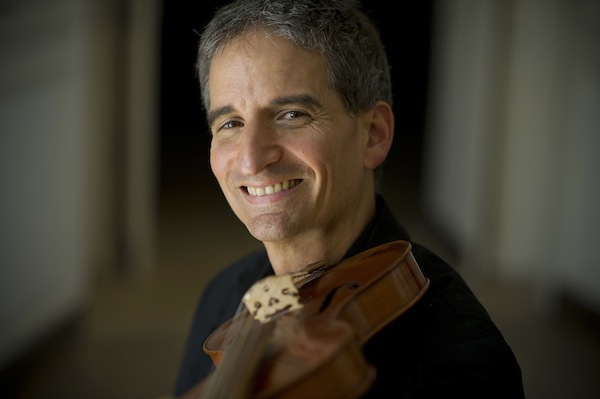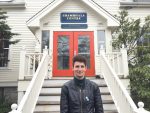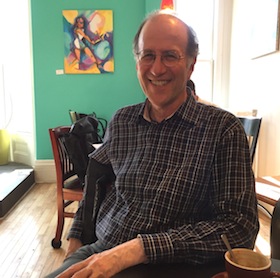Artist-in-residence David Greenberg has multiple performances at this year’s Vancouver Bach Festival: Scottish Baroque and Other Traditions. (photo by J.B. Millot)
Violinist David Greenberg teaches a course called Cape Breton-Baroque Integration, which is “devoted to creating living moments on the violin through the art of ‘keeping it swirly.’” He keeps it swirly by a range of techniques, but the intangible part derives from his love of Baroque and Cape Breton music.
Greenberg is co-artist-in-residence at Early Music Vancouver this year along with David McGuinness, and the pair will play in a few performances as part of this summer’s Vancouver Bach Festival: Scottish Baroque and Other Traditions, which takes place July 26 to Aug. 6 at various venues in Vancouver.
Early Music Vancouver’s artists-in-residence program started last summer, with Cree-Métis Two-Spirit baritone Jonathon Adams. The program was initiated by EMV artistic and executive director Suzie LeBlanc “to honour Canada’s diverse heritages while at the same time exploring the convergences between ‘world music’ and early music.” Greenberg came to be an artist-in-residence through his connection to LeBlanc, who is an interdisciplinary artist – he has performed with her many times over the years.
“Many of those collaborations involved a degree of integration between folk and Baroque music,” Greenberg told the Independent. “Often, those collaborations included David McGuinness, who is also a close friend and colleague from Glasgow, a scholar of 18th-century Scottish music, a brilliant musician on various keyboard instruments and the founder and director of Concerto Caledonia.
“David and I have worked together for over 20 years,” said Greenberg, “mostly on projects that involve some degree of Baroque-traditional stylistic integration. Suzie asked David and me to be co-artists-in-residence for the 2022 festival since this year’s theme is the integration of Baroque and Scottish traditional music.
“Over the two-week festival … David and I will perform solo, chamber and orchestral concerts. We will also coach young musicians and perform with BOMP (Baroque Orchestra Mentorship Program) as part of our activities.”
Greenberg was born in Washington, D.C., and grew up in Maryland. He lived in Canada for 30 years, but is currently living in Corvallis, Ore.
A graduate of Indiana University’s Early Music Institute, he has performed, taught and recorded in multiple places around the world, but mainly in North America and Western Europe. In addition to LeBlanc, he has performed with more than a dozen groups and performers, and been a guest soloist and/or director with several orchestras. Between these collaborations and his own ensemble Puirt a Baroque (pronounced poorsht-a-baroque, and meaning tunes from the Baroque), he has recorded more than 80 CDs. As well, he is a composer and arranger, and he co-authored Traditional Celtic Violin Music of Cape Breton: The DunGreen Collection with Kate Dunlay.
“I started playing at age 4, dabbled in both classical music and traditional folk fiddle as a kid, went to conservatory and got depressed, switched over to Early Music performance, which suited my temperament better, and joined Tafelmusik (Toronto-based Baroque orchestra) for a decade in the ’90s,” said Greenberg.
“Alongside my Baroque playing, I dove into learning the Cape Breton fiddle style, started a few bands, worked with many colleagues around the world…. The combination of the Baroque and Cape Breton musical languages is where my sense of 18th-century Scottish violin music comes from. Italian and Scottish composers are connected by way of some Italians living and working in Scotland in the 18th century, resulting in an inevitable mixing of the styles, though to what degree is a matter of opinion.”
He said the fun thing about the Baroque and Cape Breton styles “is how their esthetic hierarchies are totally different. So that means they work as effective comic relief for each other! Cape Breton music is basically the continued, naturally evolving, living tradition of 18th-century Scottish Highland fiddling. A strange fact is that Baroque music was popular in Scotland about 50 years beyond when it died out in continental Europe. That means that the Scottish traditional music and Scottish Baroque music coexisted side-by-side in 18th-century Scotland, including many examples of music that lie somewhere between the two styles.”
Greenberg plays a Baroque-style violin made in 2000 by Masa Inokuchi in Toronto. He said, “Cape Breton music is played on a modern fiddle these days, but it works on a Baroque fiddle within the appropriate context.”
And as for a little more context on Greenberg and his musical range, he shared, “My mom has always loved singing Yiddish songs and accompanying herself on the piano. I enjoy backing her up on fiddle when I visit her.”
For tickets go to the Vancouver Bach Festival, visit earlymusic.bc.ca.



